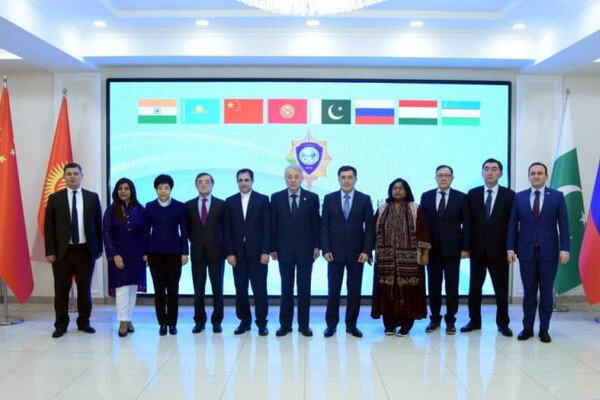Iran signs draft status for full SCO membership

TEHRAN — Following consultations between authorized representatives of the member states of the Shanghai Cooperation Organization (SCO) and Iran, a signing ceremony was arranged for Iran’s membership protocol in Tashkent on Friday.
The document approved the draft memorandum of obligations of the Iranian side in order to obtain the status of a SCO member state.
The event was attended by Deputy Minister of Foreign Affairs of the Republic of Uzbekistan Vladimir Norov, heads of the permanent bodies of the SCO, national coordinators of the member states, as well as heads and representatives of the diplomatic missions of China and Iran in Tashkent.
The signing of the protocol was a practical step towards the implementation of the decision taken last year by the leaders of eight states at the Dushanbe SCO summit to start the procedure for admitting Iran to the permanent membership of the organization.
The document testifies to the readiness of the Iranian side after acquiring membership to comply with the goals and principles of the SCO Charter, international treaties and documents adopted within the organization, to contribute to the development of friendship and mutually beneficial cooperation with member states, to increase the authority of the SCO in international and regional affairs.
The next stage of this process will be the signing of the memorandum of commitments on the sidelines of the forthcoming SCO summit in Samarkand in September this year and the fulfillment of these obligations. After that, the heads of member states will consider granting Iran the status of a SCO member state.
Deputy Minister of Foreign Affairs of the Republic of Uzbekistan Vladimir Norov in his speech drew attention to the fact that since 2005 Iran, as an observer state, has been actively participating in the activities of the SCO.
Norov said Iran regularly participates in meetings of the main bodies and consultations on regional security issues. In particular, he said, the competent structures of “the Islamic Republic of Iran have established and maintain working contacts with the Regional Anti-Terrorist Structure of the SCO.”
“The entry of such a state as Iran expands the zone of ‘geographical responsibility’ of the SCO, opens up new prospects for the development of regional cooperation. Our organization is confidently moving towards broad transcontinental cooperation in the vast Eurasian space. This, undoubtedly, will allow us to take a fresh look at topical issues of the regional and global agenda,” said Norov.
SCO Secretary-General Zhang Ming, who participated in the conference through videoconference, expressed gratitude to the Uzbek side presiding over the SCO for organizing this event and to all parties for the well-coordinated work on agreeing documents aimed at admitting Iran to the SCO.
The delegations speaking at the consultations positively noted the efforts made by the Uzbek side within the framework of the chairmanship in the SCO, including in terms of further strengthening the international role and authority of the organization.
On September 17, 2021, it was announced that Iran would become a full member of the SCO.
Chinese President Xi Jinping, who addressed the summit virtually, confirmed that from September 17, Iran will become a permanent member of the SCO.
Indian Prime Minister Narendra Modi greeted Iran’s full membership.
Addressing the SCO summit on the same day, Iranian President Ebrahim Raisi said, "Strengthening bilateral cooperation, especially in the field of economy is an important factor in improving the strategic role of the Shanghai Cooperation Organization in global economy."
Raisi called the SCO summit "one of the few" opportunities for dialogue to ensure real peace and cooperation at the regional level.
In another part of his speech, Raisi noted that his government’s foreign policy orientation will focus on "economic multilateralism" and strengthening "neighborhood policy" in its broadest sense, and strengthening its presence in regional organizations.
He also mentioned Iran’s vast potential in terms of geopolitics, population, energy, transportation, human resources, and most importantly spirituality, culture and civilization.
The president also underscored that the world has entered a new era.
"Hegemony and unilateralism are declining. The international system is changing towards the polarization and redistribution of power in favor of independent states," he said.
Raisi called Iran the connecting link between South and North Eurasia through the North-South Corridor, connecting Central Asia and Russia to India.
The president also noted that Iran’s foreign policy has always been based on active participation in international organizations, multilateralism and opposition to unilateralism based on justice, cooperation, mutual respect and the need to play a constructive role in facing international and regional challenges.
“The U.S. and the West always oppose the improvement of Iran's relations with others since that helps it better withstand their so-called “maximum pressure” campaigns. Iran's full membership in the SCO will enhance its soft security by enabling it to more effectively manage the chaotic situation in neighboring Afghanistan. The country's socio-economic situation might also continue improving with time too as the SCO members pioneer new connectivity corridors through China's Belt & Road Initiative (BRI),” said Andrew Korybko, a geopolitical analyst in an interview with Tehran Times.
In this regard, Leonid Ivashov, director of the Russian Center for Geopolitical Studies, also said, “Iran is a reliable partner for the Shanghai Cooperation Organization, and its membership is important and effective in increasing regional security.”
“Expanding exports and imports with members of the Shanghai Cooperation Organization will also facilitate Iran's trade relations with the world,” Alireza Peyman Pak, head of Iran’s Trade Promotion Organization (TPO), told IRNA on October 16.
Leave a Comment